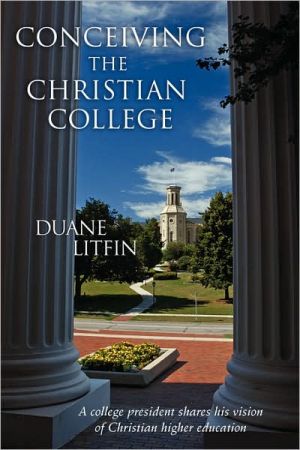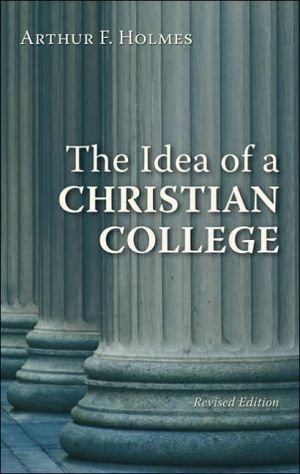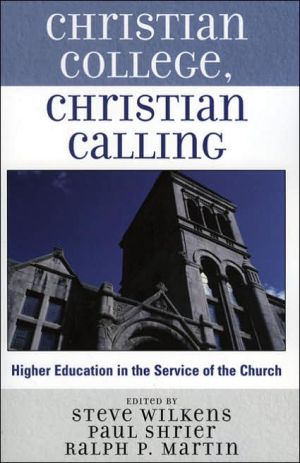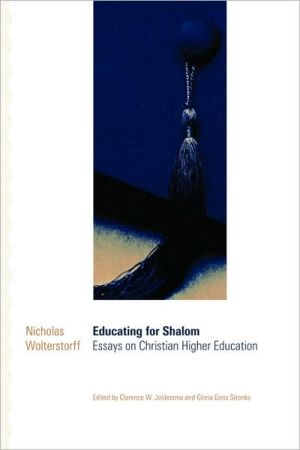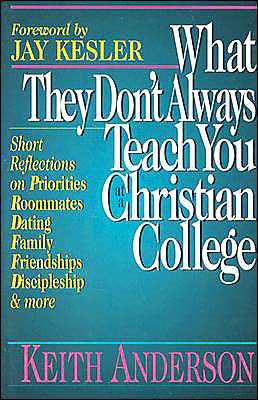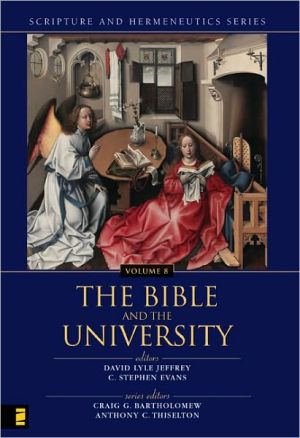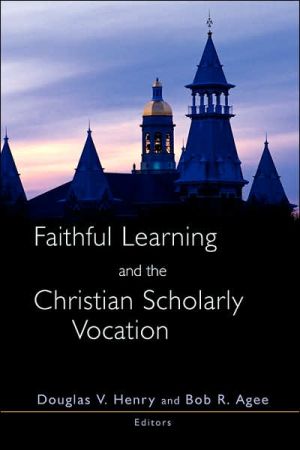Conceiving the Christian College
Search in google:
Conceiving the Christian College\ \ By Duane Litfin \ William B. Eerdmans Publishing Company\ Copyright © 2004 Wm. B. Eerdmans Publishing Co.\ All right reserved.\ ISBN: 0-8028-2783-7 \ \ \ \ Chapter One\ Introduction \ This book might have been titled The Ideas of a Christian College. Conjuring up John Henry Newman's classic, The Idea of a University, and a century and a quarter later, Arthur Holmes's widely used The Idea of a Christian College, such a title might have suggested these chapters are about how we are to understand the task of this unique type of educational institution, the Christian college. And that would have been a good thing, for it is indeed what this book is about.\ In other ways, however, such a title would not do. First, it would be presumptuous to associate this book so closely with two such important and influential works. Second, the title skirts too close to Holmes's own to be fair to that estimable text, which after twenty-five years is still in print. Third, the distinction between Idea in these older titles, and the plural Ideas in my own, would be so small as likely to be lost. Yet it's an important difference. Newman and Holmes attempt to flesh out the overall concept of their respective subjects; my focus is more selective. Fourth, and in consequence, the definite article suggests too much. The book you hold in your hands is not about the requisite ideas of a Christian college, as if to suggest I will deal with them all. As I say, my goal is more modest.\ I am after only a handful of salient ideas that currently need some special attention. Despite their critical importance to Christian higher education, some of these ideas are so overworked as to be, paradoxically, under-appreciated, under-developed, or even misunderstood. In other instances they are simply neglected. In a few cases, somewhat mysteriously, they are ideas one hardly finds discussed at all in the literature on Christian higher education.\ What these ideas hold in common, however, is that each in its own way is important, even crucial, to the task of Christian higher education. Hence each deserves our clearest and most careful thinking. Those who are engaged in Christian higher education - teachers, administrators, board members, students, parents, supporters, and even those who are simply interested bystanders - are alike in their need to grapple with these ideas with skill and sophistication.\ Furthermore, if the concepts we will discuss in this book are important to the world of Christian higher education, some of them are also painfully out of step with the intellectual climate of our times. Yet if we ignore these ideas, or take them for granted, or downplay them because of their being out of step, they will not merely atrophy and die away; they will be swept away by those who oppose them, and Christian higher education will go with them. What we require, anew for every generation, are clarion calls designed to remind us of what it is we do and why. I hope it is not too audacius to claim that the goal of this book is to offer a few such calls. Whether it succeeds or not, the reader will decide. But that is my intent. As Oscar Wilde once quipped, "On an occasion of this kind it becomes more than a moral duty to speak one's mind. It becomes a pleasure."\ This book therefore focuses not simply on the ideas of a Christian college, but on the clarity with which we understand these ideas and the strength with which we hold them. There are, I believe, a number of fresh insights in the following chapters - or at least insights I cannot find much discussed elsewhere, despite their importance - but in many ways these chapters do not attempt to say much that is novel. Quite the contrary, they are exercises, as Plato's Thamus might have put it, "not of memory, but of reminding." They are efforts to state again what must be stated again - and again, and again. They constitute an attempt to think through some age-old responses to our contemporary challenges, to wrestle anew with questions such as: What is unique about us? How are we to conceive of ourselves against the backdrop of other types of institutions, even other religious institutions? How do we maintain our bearings in the tumultuous intellectual seas of the twenty-first century? What, after all, are those bearings? How do we keep moving forward amidst the inevitable buffetings of our secularized academic environment? What is required to sustain our institutions - that is, to ensure that we will deliver them to future generations in recognizable form? What is our unique contribution to the marketplace of ideas? How does Christian higher education fit within the broader academic culture, and to what ends should we be working there?\ I hold no illusion that this treatment will exhaust the list of challenges facing the contemporary Christian college. There are many daunting problems I will leave untouched. Consider for example this very different set of questions: How can Christian colleges attract and retain an excellent student body? How do we recruit and then facilitate the work of a first-rate faculty? How do we keep pace with the ever-quickening demands of technological change, much less harness these changes to enhance our students' learning? How do we keep our costs low enough, and our student aid high enough, to remain accessible to a wide variety of students, all the while funding strong academic programs? How are we to diversify our campus communities, drawing in more of those minority populations who have not traditionally been attracted to Christian colleges? How can we resist the inexorable pressures toward the vocationalizing of our curriculum? How do we globalize our curriculum?\ These and other practical issues weigh daily upon Christian colleges, demanding our best efforts. But I will not attempt to address them here. As important as these issues are, our present concerns cut deeper, to matters of the core. Our focus in what follows has less to do with means than with ends, less with these pressing practical dilemmas than with key conceptual challenges relating to our core mission as Christian scholars and educators.\ Even with regard to this missional core, however, we must acknowledge some limitations. For instance, while we will touch upon it here and there, contemporary writers such as George Marsden, James Burtchaell, Robert Benne, Philip Gleason, and Douglas Sloan give far more attention than I do to the challenges of the so-called slippery slope on which modern religious institutions reside. In a sense, my purpose is not so much to explore that slope as to render it less slippery, or at least to point us again to our strong footholds. Or, taking a different tack, writers such as Mark Noll, Richard Hughes, Cornelius Plantinga, Cliff Williams, and (again) George Marsden have focused on the larger challenges and opportunities of the Christian's intellectual task. I will crisscross their tracks in what follows, but without trying to walk in their footsteps.\ Most pertinent of all to what follows is the work of Arthur Holmes. No one has done more over the last forty years to help the members of Christian college communities think through what they are, what they are doing, and why. I have already alluded to his book The Idea of a Christian College. To this must be added other influential titles such as All Truth Is God's Truth, The Making of a Christian Mind, and Building the Christian Academy. These along with many other offerings from Holmes have made an immeasurable contribution to Christian higher education. Holmes has helped build the overarching conception of the Christian college we all live beneath; under that canopy I wish to target some specific contemporary problems.\ A Presidential Caveat\ I must acknowledge at the outset the personal dimensions of what follows. The issues I will explore are inevitably those most pressing to me; they are the matters I believe need discussion, concerns about which I have become exercised, blind spots I think need to be highlighted, challenges I have discerned and which I believe require a response. I recognize the inevitable personal character of the very selection of this subject matter.\ What's more, I know the answers I provide are also, in a sense, my own. Much of what follows was written specifically for this book. Other sections were adapted from other things I've written - books, articles, papers, even correspondence. Still other sections are based on notes from the countless talks I've given over the years. With only a few exceptions, I will not attempt to identify prior uses of this material, mainly because it scarcely matters. For our purposes it is enough to say that, for good or ill, I amresponsible for the whole. The ensuing discussion must in its entirety be preceded by the phrase, "It seems to me." In these pages the reader will inevitably be hearing the voice of this author.\ This is an important acknowledgment, not least because I do not offer this work as an official document of Wheaton College. It's tricky business for a sitting president to write this kind of book without appearing to obligate his institution to every word. Presidents are inevitably their school's chief spokespersons; in fact, their role is sometimes frighteningly described as that of a "living logo" for the school. Thus their personal pronouncements can easily be mistaken for official documents of the college itself, as if the institution were no more than the lengthened shadow of its president.\ In their treatment of Myths and Realities of Academic Administration, Patricia Plante and Robert Caret describe the care with which a president's words are often dissected. Plante and Caret's focus is the initial phase of a new president's tenure, but in a sense, the phenomenon they describe is one a president never fully escapes: "Every word, every memo, every act, every smile or frown is interpreted and reinterpreted as an exercise in forecasting. Everyone from the president of the faculty senate to the president of the chamber of commerce becomes temporarily engaged in textual analysis. Even the knowledge that such close readings often distort perspective and may be as profitable as divining by examining the shoulder blades of sacrificial sheep deters only a few from becoming instant deconstructionists.... Representatives of every constituency within and without the academy are... above all explicators of text."\ I know this phenomenon well and I understand why it exists. A president's words are closely examined because of the power and influence he or she typically wields within the institution. As its chief administrator, the president is the one at whose desk the institutional buck stops, the one who must give an account to the governing board and beyond for most everything that takes place within the institution. Because severing authority from responsibility, or responsibility from authority, in any organizational structure is disastrous, carrying the final responsibility means the president must also have a good deal of institutional clout. It cannot and should not be otherwise.\ Yet this very concentration of institutional power - combined with the dramatic enlargement of administrative and fundraising duties over the past century - has in our day contributed to the demise of the president's role as intellectual leader. If it was not always so, during the last century many college presidents came to be viewed more as managers than leaders, as administrators and facilitators rather than important participants in the intellectual life of the campus. Today's president may be asked to open the campus's academic conferences with a ceremonial welcome and "appropriate remarks," but seldom does a president wind up delivering one of its academic papers. That task falls to others.\ I cite this phenomenon not as a complaint so much as an observation. I know only too well how difficult it is for a president to retain, much less to enhance, whatever hard-won academic expertise he or she may once have enjoyed. It is the unusual college president these days who can both run an institution and remain a productive scholar. I understand this, and thus I am unsurprised that in the minds of many today, the role of the college president is best likened to that of the captain of a large cruise ship, whose task it is to keep the passengers happy, the decks clean, and the fuel tanks full. He is to show up for ceremonial occasions and sit at the captain's table looking official. But he should not suppose that it is his responsibility, much less his prerogative, actually to steer the course of the ship.\ Given their undeniable administrative power, presidents who do aspire to keeping their hand, however lightly, on the intellectual tiller of their institution can actually become worrisome creatures. Presidents with ideas, particularly certain kinds of ideas, may be considered dangerous. This point is captured well in the sometimes-heard witticism about appropriate and inappropriate roles within the academy: The job of the president, says this bit of humor, is to speak for the institution; the job of the faculty is to think for the institution; while the job of the dean is to keep the faculty from speaking for the institution and keep the president from thinking for the institution. Buried in this witticism are several barbs, but the one we're after is this: a president who aspires to think for the institution can become an awkward problem indeed.\ In his book on How Academic Leadership Works, Robert Birnbaum thankfully assures us that the situation is not quite so one-sided. Presidents need not be merely mindless bureaucrats, Birnbaum says; in fact, they must not be if their leadership is to be successful: "When they are perceived by their constituents as competent, legitimate, value-driven, of complex mind, and open to influence, presidents can be a vital source of leadership and a force for institutional renewal." Birnbaum's observation embodies a good deal of wisdom. What it does not do is answer the question of how many ideas, and of what sort, a college president shall be permitted. On that question the jury remains permanently out.\ All of which is why I say that writing a book like this, a book full of strong ideas, is tricky business for a sitting president. I wish to make it clear that this book is not an official document of the institution I serve. It is a book about some ideas that I, speaking as an individual, believe need exploration and reiteration. I use Wheaton in a few places as an illustration of this point or that because it is the institution I know best. But in most instances I do not have Wheaton particularly in mind. The topics I choose to handle and my particular way of handling them are the products of decades of academic training and experience, both as a teacher and administrator. They reflect much reading and listening, not to mention countless conversations with colleagues of every stripe from many different institutions.\ \ Continues...\ \ \ \ Excerpted from Conceiving the Christian College by Duane Litfin Copyright © 2004 by Wm. B. Eerdmans Publishing Co. Excerpted by permission.\ All rights reserved. No part of this excerpt may be reproduced or reprinted without permission in writing from the publisher.\ Excerpts are provided by Dial-A-Book Inc. solely for the personal use of visitors to this web site. \ \
1Introduction12Two academic models11Challenge : to understand more clearly our own identity3The centerpiece34Challenge : to see more fully whom we serve4A centered education64Challenge : to keep the center at the center5It's all God's truth85Challenge : to strengthen the foundations of Christian thought6A balanced epistemology99Challenge : to preserve the idea of truth7Integrative thinking : prolegomena127Challenge : to understand the integrative mandate8Doing integration149Challenge : to sustain our commitment to the integrative task9Faith and learning181Challenge : to reinforce our commitment to revealed truth10The voluntary principle214Challenge : to reconcile institutional commitments with individual freedoms11Institutional breadth237Challenge : to appreciate our institutional uniqueness12Our place in the academy254Challenge : to engender a more congenial academic environment254
